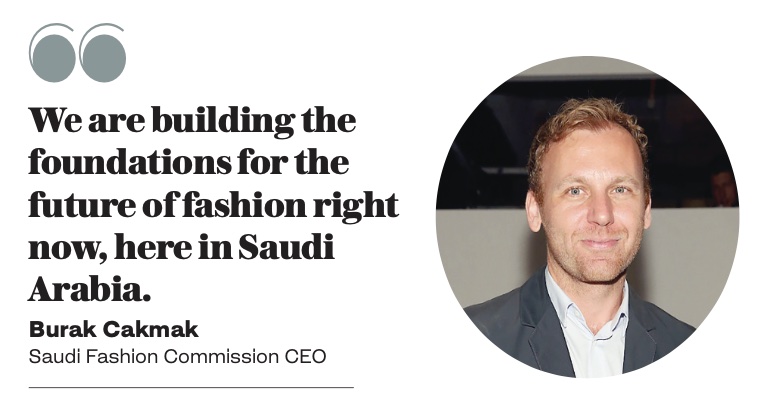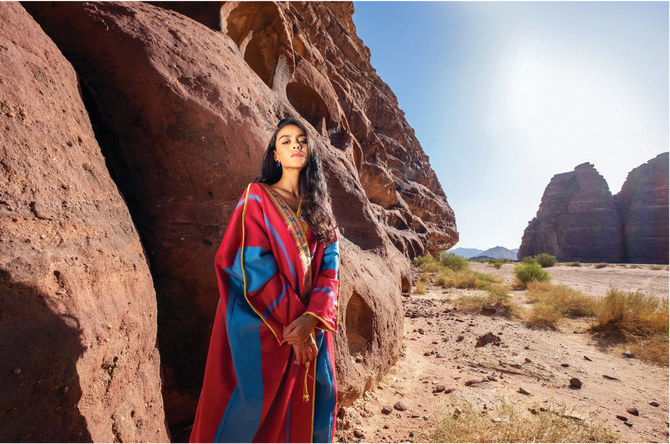RIYADH: Until recently, the Saudi capital of Riyadh was hardly ever looked upon as a hotspot on the global fashion circuit. New York, Milan and Paris — these are the mainstays for fashion weeks, the cities where established and aspiring designers, buyers, and journalists have long gathered.
But times are changing, and Gulf countries are quickly becoming new hubs for the industry, particularly Saudi Arabia, where retail demand for fashion products has been forecast to increase by 48 percent to $32 billion in 2025, with the luxury field set to enjoy a 19 percent growth.
FASTFACT
Times are changing, and Gulf countries are quickly becoming new hubs for the industry, particularly Saudi Arabia, where retail demand for fashion products has been forecast to increase by 48 percent to $32 billion in 2025, with the luxury field set to enjoy a 19 percent growth.
With the first ever Riyadh Fashion Week underway from Oct. 20 to 23, Saudi designers will come into the spotlight on the catwalk in the capital of their own country. It is one of several of the Fashion Commission’s recent initiatives, following the launch of the ‘Saudi 100 Brands’ exhibition during Paris Fashion Week in June.
“Fashion retail has always been an attractive sector, specifically for women in Saudi,” Marriam Mossalli, a Saudi lifestyle editor, journalist and founder of communications agency Niche Arabia, told Arab News. “From sourcing fabric to working with local tailors; to selling within their immediate community; the profession has fit comfortably within our local ecosystem.”

She added: “Today, however, the appeal is global. With social media and e-commerce, the potential for many designers has grown exponentially as it’s not limited to their local market.”
The attention being paid to the industry signals the government’s belief in the sector’s potential for economic growth.
This shift has not happened by chance. The fashion industry has been identified as a key avenue for economic diversification for Saudi Arabia and is one of the non-hydrocarbon sectors rapidly on the rise.
Under the Fashion Commission, which was one of 11 such bodies established in 2020 by the Ministry of Culture, a plethora of initiatives to further grow the sector both publicly and privately are being implemented.
The commission’s March 2023 report “The State of Fashion in the Kingdom of Saudi Arabia 2023” provides an analysis of the Kingdom’s fashion value chain.
It revealed Saudi Arabia’s plan to reduce reliance on overseas imports and put the country on the map by using homegrown talent. It also highlights the sector’s potential for growth.
In the report, Saudi Fashion Commission CEO Burak Cakmak said: “We are building the foundations for the future of fashion right now, here in Saudi Arabia.”
With retail demand for fashion products projected to increase by 48 percent to $32 billion by 2025, the Saudi fashion industry is positioned for significant expansion.
In 2021, Saudi Arabia’s fashion industry spent $7.3 billion on imported goods, showcasing the potential economic impact of fostering domestic capabilwities.

The report showcases the sector’s rapid development, its strategic alignment with the nation’s Vision 2030, and how the Kingdom’s youth are putting the country on the global fashion stage through new designs and product launches.
It states how the fashion ecosystem is estimated to contribute to 1.8 percent of the total Saudi workforce, employing 230 000 people. The industry has a 52 percent female participation in the Saudi fashion workforce and 66 percent Saudization within core fashion jobs. This workforce is made up of 90,000 core fashion occupations and 140,000 related roles.
Moreover, domestic retail sales in the Kingdom are forecasted to reach $32 billion in 2025, a 30 percent growth from 2021’s total of $24 billion. Luxury fashion is a significant driver of growth, with the market growing by 19 percent in 2021 due to repatriation of spending given travel restrictions, increased female empowerment and the continued rise of e-commerce.
The market for fashion in the Kingdom is also growing due to external players and their eagerness and readiness to do business in Saudi Arabia.
These include the major luxury and fashion retail powerhouse Dubai-based Chalhoub Group, which has increasingly been doing business in the Kingdom.
Jasmina Banda, chief strategy officer at Chalhoub Group, says the business has been operating in the Kingdom for over 30 years, and currently operates over 250 stores spread across the Kingdom.
It also has over 4,000 team members, six warehouses, and is currently building a state-of-the-art fulfillment facility in Riyadh. It has dedicated offices across the Kingdom, including retail academies.
“For Chalhoub, the Kingdom remains our second-largest market,” Banda told Arab News. “In the luxury space, Saudi Arabia is overall the second-largest market, even though that varies by category.
“For example, in prestige beauty, Saudi is a strong number two, competing with the UAE, while in high-end fashion it comes in at No. 4, after the UAE, Kuwait, and Qatar, as it is a category extensively bought abroad.”
She added: “Over the last few years the Saudi fashion market has seen a strong growth, especially during the COVID-19 years when the borders were closed.
“Since reopening, we continue seeing increased offshoring of luxury spend abroad and we expect major transformations in our retail categories to happen in the coming years, as new shopping malls open — currently there are more than five luxury destinations in different stages of construction in the Kingdom.”

Saudi women have long been known as big buyers of luxury fashion, Banda said, adding that people in the Kingdom are known for following trends on social media and being well-traveled.
“That is further shifting with the socio-demographic changes in Saudi Arabia, stemming from female empowerment and increasing workforce participation, as well as changes in the habits driven by entertainment options – cinemas, restaurants, concerts, etc.,” she said.
Banda also explained how when it came to marketing to Saudi consumers, buying and merchandising are tailored to the consumer preferences in terms of silhouette, color palette and sizing.
“Especially important seasons, such as Ramadan, are addressed through dedicated capsule collections, and specific marketing campaigns and activations. It is important to be bring to the customer global brands, in a tailored ‘glocal’ way,” she said.
All of Chalhoub’s largest luxury fashion brands are already present in Saudi Arabia.
Banda notes how in the luxury sector, Saudi Arabia represents 9 percent of the global market, due to the offshoring of spend. Saudis are often the top nationality shopping in Dubai, and increasingly in Qatar. In prestige beauty, however, Saudi Arabia represents one third of the Gulf Cooperation Council market.
“On the other hand, for some of the leading watches and jewelry brands, Saudi Arabia is the No. 1 market in the region by size. Maturity really varies by category,” she said, adding: “However, Saudi consumers are also frequent clients of top luxury brands in Europe, previously in the UK and France, and now predominantly in France — since the UK stopped tax free.”
Saudi spending on fashion will likely grow “exponentially,” she emphasizes, “once the country fully delivers on its tourism ambitions.”
The Fashion Commission’s report states how major opportunities for economic growth now lie within the sector’s nascent domestic fashion industry.
Rajaa Moumena, who sits on the board of the fashion association that works directly with the commission, believes the local industry is still in the early stage of development.

She said: “It is currently at the phase of awareness and setting up the appropriate legislation to create an enabling environment for entrepreneurs to start their businesses.
“This involves addressing various aspects such as licensing, permits, and regulations that govern the industry.”
One of the primary focuses, stresses Moumena, of Vision 2030 is to promote local production and reduce reliance on imports. This includes the production of all types of clothing, ranging from ready-to-wear garments to high-end haute couture. By encouraging local production, Saudi Arabia aims to create job opportunities, boost economic growth, and retain revenue within the country.
She emphasized that education is key for the domestic sector to grow.
“As the industry evolves and adopts new concepts, it is essential for educational institutions to keep pace with these changes. This means updating curricula, offering specialized courses, and providing students with practical skills required for the fashion industry. This will help opening doors to many jobs where skillful people are needed in the industry,” said Moumena.
By encouraging the Saudi youth to be creative and business savvy, Riyadh may soon be a permanent fixture on the global fashion calendar.



















